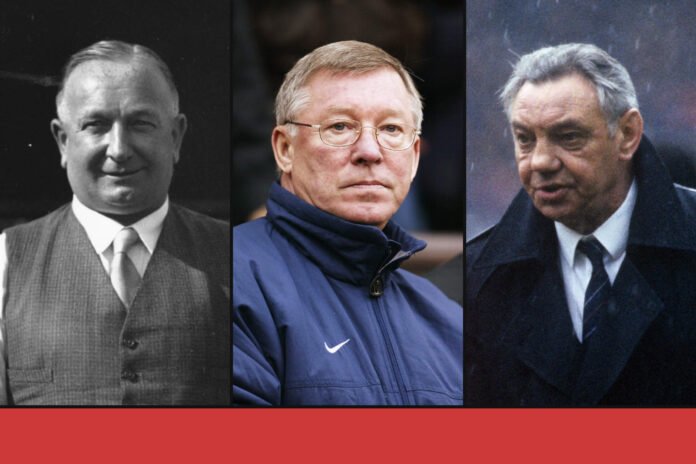Manchester City are two games away from winning a fourth consecutive league title, something that has not been done in the 135 years since Preston North End claimed England’s first. Some clubs have won four titles in five seasons, such as Aston Villa in the 1890s or Liverpool in the 1980s, but not even these great, dominant teams won four in a row.
On five occasions a club has won a hat-trick of titles and set off the following season to win a fourth — Huddersfield Town (1926-27), Arsenal (1935-36), Liverpool (1984-85) and Manchester United (2001-02 and 2009-10) — but each time they have fallen short.
Each club failed in its own way, even if failure feels too severe a word. There are, however, themes recognisable down the decades: managerial disruption; key player departures and injuries; cup distractions; rising rivals.
A reason City look destined to become the first to win four consecutive titles is that only the last of these applies to them, in the shape of Arsenal. City are in the FA Cup final against Manchester United, but that is hardly keeping Pep Guardiola awake at night. Those four historic factors are also offset by City’s modern strengths — limitless wealth, Guardiola and experience.
Managerial disruption
Any discussion of the greatest figures in English football often begins with Herbert Chapman. A Yorkshireman born in 1878, Chapman may appear unfeasibly distant but he is regarded as the first modern manager, a man who shaped the game forever.
Chapman’s arrival at Huddersfield Town in 1921 initiated a revolution at a club who, at that stage, had never won a trophy.
They were improving, though. In 1920, they were promoted to England’s top tier, the old First Division. They also reached a first FA Cup final, losing to Aston Villa. It shows Chapman had talent to work with.
But he made at least two stellar signings: Clem Stephenson, 30, an established captain from Villa, and George Brown, a teenager plucked from a Northumberland coal mine. In 1922, Huddersfield won the FA Cup and in the 1923-24 season, they were champions of England.
Herbert Chapman (back row, far left) and his great Huddersfield side of 1922 (PA Images via Getty Images)
It was by the narrowest of margins – goal average, the division of the number scored by the total conceded, which predated goal difference. The last goal of the season, scored by Brown, effectively took Huddersfield ahead of Cardiff City. For a provincial side, this was enormous. Arsenal, for example, had not yet been champions and City would not be until 1937.
That Chapman organised a Town repeat in 1924-25 was even more impressive. Huddersfield conceded a mere 28 goals in 42 games and Chapman was christened the ‘Napoleon of football’.
Then Arsenal signed Napoleon and Huddersfield had to react.
As with VARs today, times were changing. Arsenal corner-kick enthusiasts of 2024 will note that in 1924 players were now allowed to score directly from a corner. The first to do so was a Chapman player, Billy Smith. And in 1925-26 a more seismic change was introduced: the offside law now decreed that instead of needing three opponents (usually including a goalkeeper) to be between an attacking player and the goal, now it was two. The aim was to stimulate higher scoring.
It worked. Huddersfield still had the best defence in the country, but they conceded 60 goals. And they had their third consecutive title, despite the loss of Chapman.
Former Derby County manager Cecil Potter had succeeded Chapman, “against his own inclinations,” reported the Derby Telegraph newspaper. Potter coped with the upheaval but as he and the players prepared for a unique four-in-a-row, suddenly Potter was gone. It was “on account of ill health”, apparently. In came Jack Chaplin, a Scot and former Manchester City full-back. He had joined Huddersfield as a trainer under Chapman.
According to the Athletic News, Chaplin “has gained a real reputation as the man who has kept the Town players fit through three championship campaigns”, but by the third Saturday of the 2026-27 season, when beaten 2-0 at home, one headline read: “Not like the real Huddersfield.”
And so it proved. Newcastle United were champions in 1926-27, with Town second having drawn 17 games. They were fractionally less effective, which may ring a bell with Gary Neville about United in 2001-02.
Any perception United slackened off in the seasons after winning the historic 1999 treble is misplaced. In 1999-2000, they won a second consecutive title, by 18 points from Arsenal, and in 2000-01 it was by 10 points.
But at the end of that third Premier League triumph in 2001, Sir Alex Ferguson announced he would be retiring the following year. Neville said once Ferguson had shared his news “its unsettling effect was indisputable”. Ferguson later said, “There wasn’t the same performance level on the pitch.” United dipped a little, three points worse than the previous season, but finished third.
-
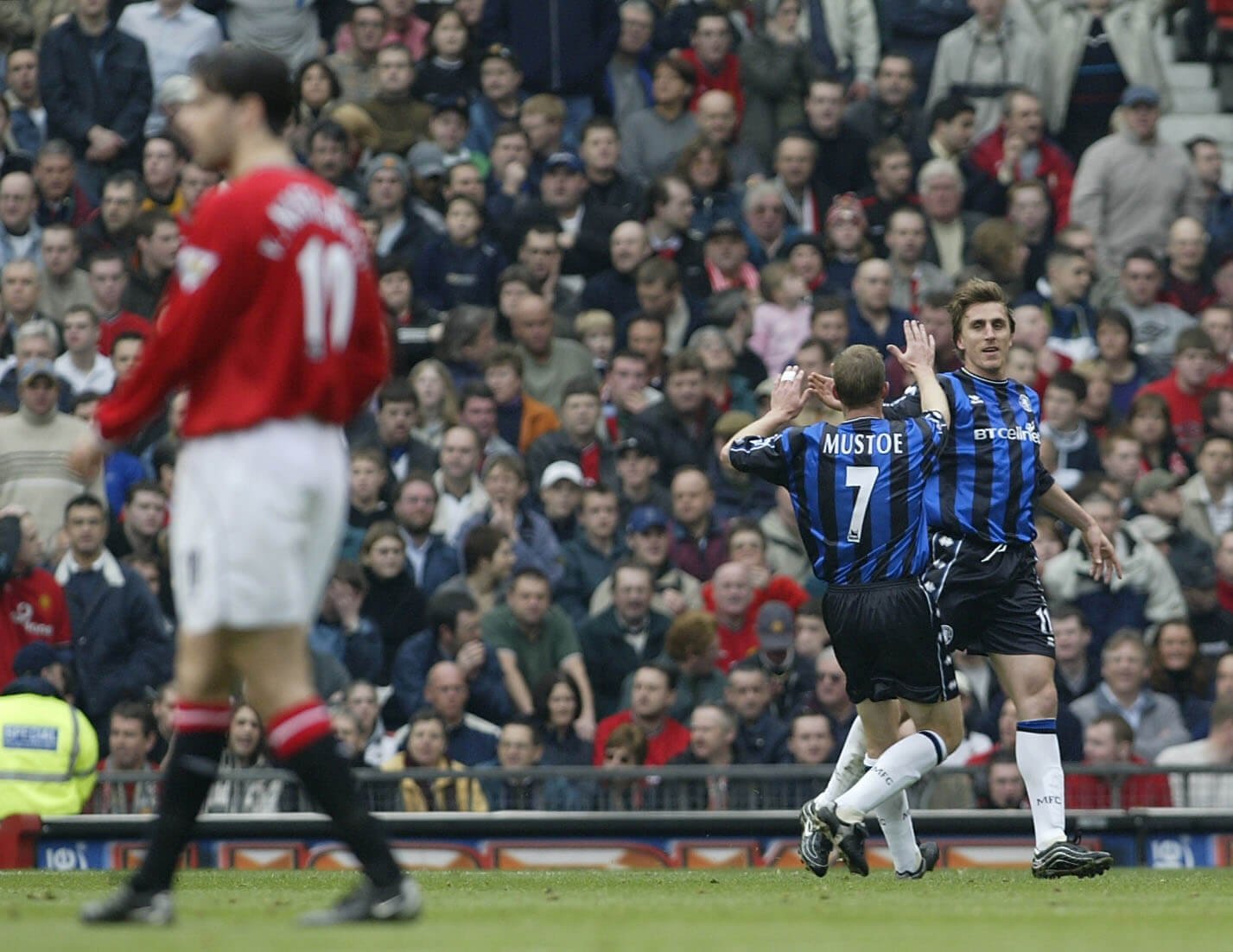
Alen Boksic celebrates scoring Middlesbrough’s winner at Manchester United in March 2002 (Laurence Griffiths/Getty Images)
Liverpool in 1984-85 turned out to be Joe Fagan’s second and last season. Given they finished second, reached the European Cup final and the semi-final of the FA Cup, it would be a stretch to call the season a failure. But as Fagan said: “By Liverpool’s standards I realise we have been a bit disappointing.” He was 64, but managerial uncertainty did not hang over the season and did not cause the slip.
In January 1934, Arsenal had to deal with the shocking sudden death of Chapman in mid-season. The 55-year-old was repeating his brilliance from Huddersfield, having led Arsenal to the title in 1930-31 and again in 1932-33. They were four points clear of Derby in the 1933-34 campaign when, on the morning of January 6, Chapman died of pneumonia.
Arsenal placed secretary George Allison in charge and the players won the league by three points. Arsenal won a third consecutive title in 1934-35, scoring 115 goals, 25 more than second-placed Sunderland. Tom Whittaker, the Chapman-appointed Arsenal coach, attributed this to all being “steeped in the knowledge” of their former leader. There was continuity even without Chapman.
Arsenal began the defence of their third title with a 3-1 win against Sunderland in front of 66,000 at Highbury. Ted Drake scored twice that day and, in mid-December, got all seven goals in a 7-1 defeat of Villa.
Arsenal looked set, sitting fourth in the table, averaging about 2.5 goals a game. But they lost to Liverpool on Boxing Day, then in February Drake was injured and missed two months. Plus, the FA Cup started and Arsenal wanted to win it. They ultimately finished sixth.
“It was obvious we were going to have a Herculean task in defending the ‘property’ we had won over three years,” Whittaker said.
Key player departures and injuries
Bob Paisley bowed out at Liverpool with league titles in 1981-82 and 1982-83 (by 11 points). In 1983-84, Fagan added another, as well as the European Cup and League Cup.
Even for such a brilliant team, beating that in 1984-85 was always going to take some doing. When the next season began, Liverpool won only two of their first 11 league games culminating in a 1-0 home defeat by Everton, their rivals’ first at Anfield in 14 years, courtesy of Graeme Sharp’s spectacular goal. Liverpool were 17th, their worst league position since 1970.
The explanation was on the pitch. Graeme Souness, the club’s greatest midfielder, had moved to Italy. The hole he left was always going to be impossible to fill, even though Liverpool bought excellent midfielders in John Wark and Jan Molby. “We definitely missed Graeme,” Kenny Dalglish said.
And for the first time since his arrival in 1977, the equally great Dalglish, now 33, was in single figures for goals. It sounds simplistic, but these are reasons why there was no fourth consecutive title. As Ferguson said: “The Souness-Dalglish Liverpool teams were the benchmark for English football.”
Just as Arsenal missed Drake, Liverpool missed Ian Rush. In 1983-84, Rush scored 47 goals in all competitions, 32 of them in the league. He and Dalglish were like Erling Haaland and Kevin De Bruyne. In 1984-85, hit by injuries, Rush got 14 goals in 28 league appearances.
Ferguson understood the cost of losing keystone players. After he had announced his intention to retire he produced another shock, selling Jaap Stam to Lazio. United’s defence was wrong-footed. In 2000-01, they conceded 0.8 goals per Premier League game; in 2001-02 it was 1.2.
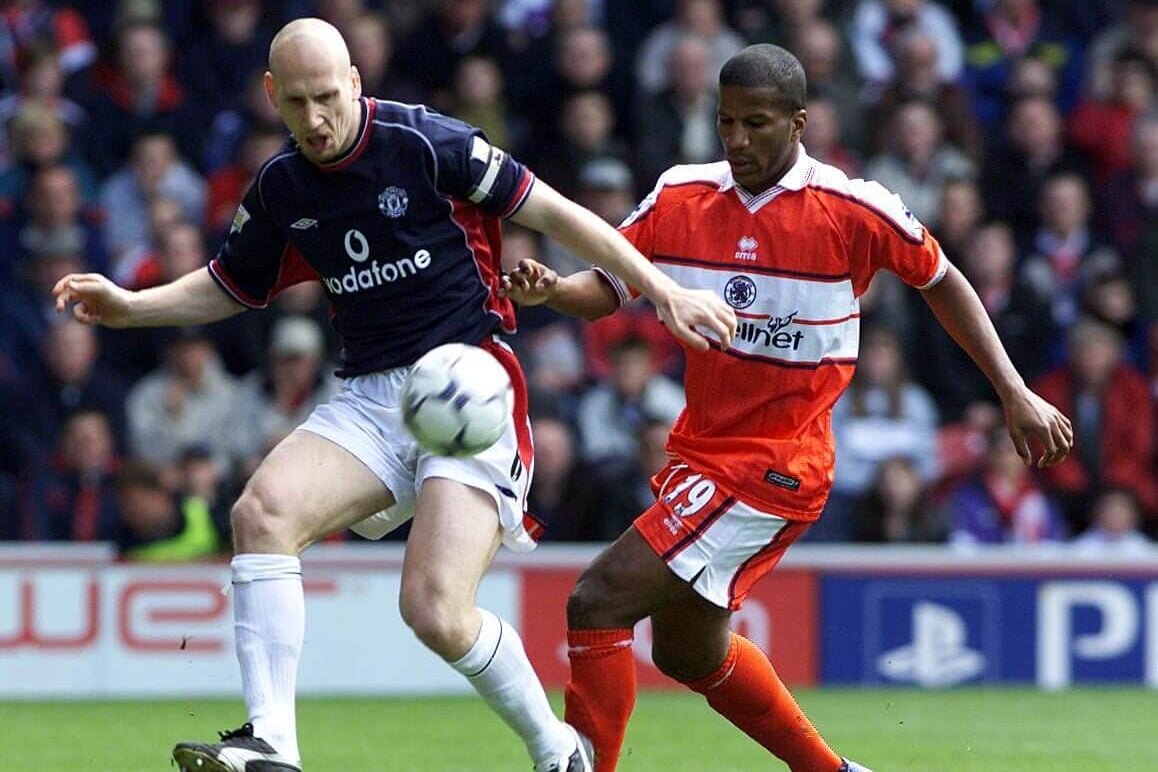
Jaap Stam was sold by Sir Alex Ferguson in 2001 (Laurence Griffiths/ALLSPORT)
Ruud van Nistelrooy came from PSV Eindhoven in the summer of 2001 and scored 23 goals in 32 Premier League appearances, but the signings of Juan Sebastian Veron and Diego Forlan were less convincing. Ferguson was vehement in his defence of Veron at the time; in his 2016 book Leading, he wrote Veron was one of those players “immune to discipline — try as I might, I could not get him to fit into our system”.
Eight years later, in the 2009-10 season, Ferguson had to deal with a Souness-like departure when Cristiano Ronaldo left for Real Madrid. With Carlos Tevez also gone, Ferguson worried about “our strike force (being) a little gap-toothed for a while”.
Ronaldo’s goal tallies in his previous three Premier League seasons were 17, 31 and 18. His absence was felt in 2009-10, yet with Wayne Rooney getting 26 goals, United actually scored 86 — more than in the three previous seasons when they had been champions. There was another major factor — Chelsea, who beat them to the title by a point.
City have dealt with some injuries this season — De Bruyne, John Stones — but the squad is resilient and deep. They have lost players in the transfer market too — Riyad Mahrez, Aymeric Laporte and Cole Palmer among others. But Guardiola’s core team has not been weakened. Mateo Kovacic, Josko Gvardiol and Jeremy Doku have all been fitted in seamlessly.
Cup distractions
Ferguson’s regret was that he and United did not win more Champions Leagues. “I always said Manchester United ought to be achieving more in Europe,” he said.
With Neville later admitting he was “bored” by United’s domestic domination, the Champions League became their focus. In April 2010, United were 4-2 ahead on aggregate against Bayern Munich at Old Trafford in the quarter-finals. Another semi-final looked on. Then Rafael was sent off, Arjen Robben scored an aggregate equaliser and United went out on away goals.
The European hangover contributed, three days later, to a 0-0 draw at Blackburn. A win would have put United top of the Premier League. “It makes it really difficult to win the league now,” Ferguson said.
In 2001-02, the added European distraction for Ferguson was the final being staged in his home city of Glasgow — “The urge to lead the team out at Hampden Park obsessed me.”
But United lost on the away goals rule to Bayer Leverkusen in the semi-final and, as in 2010, they did not win their next Premier League game after that exit. It again told.
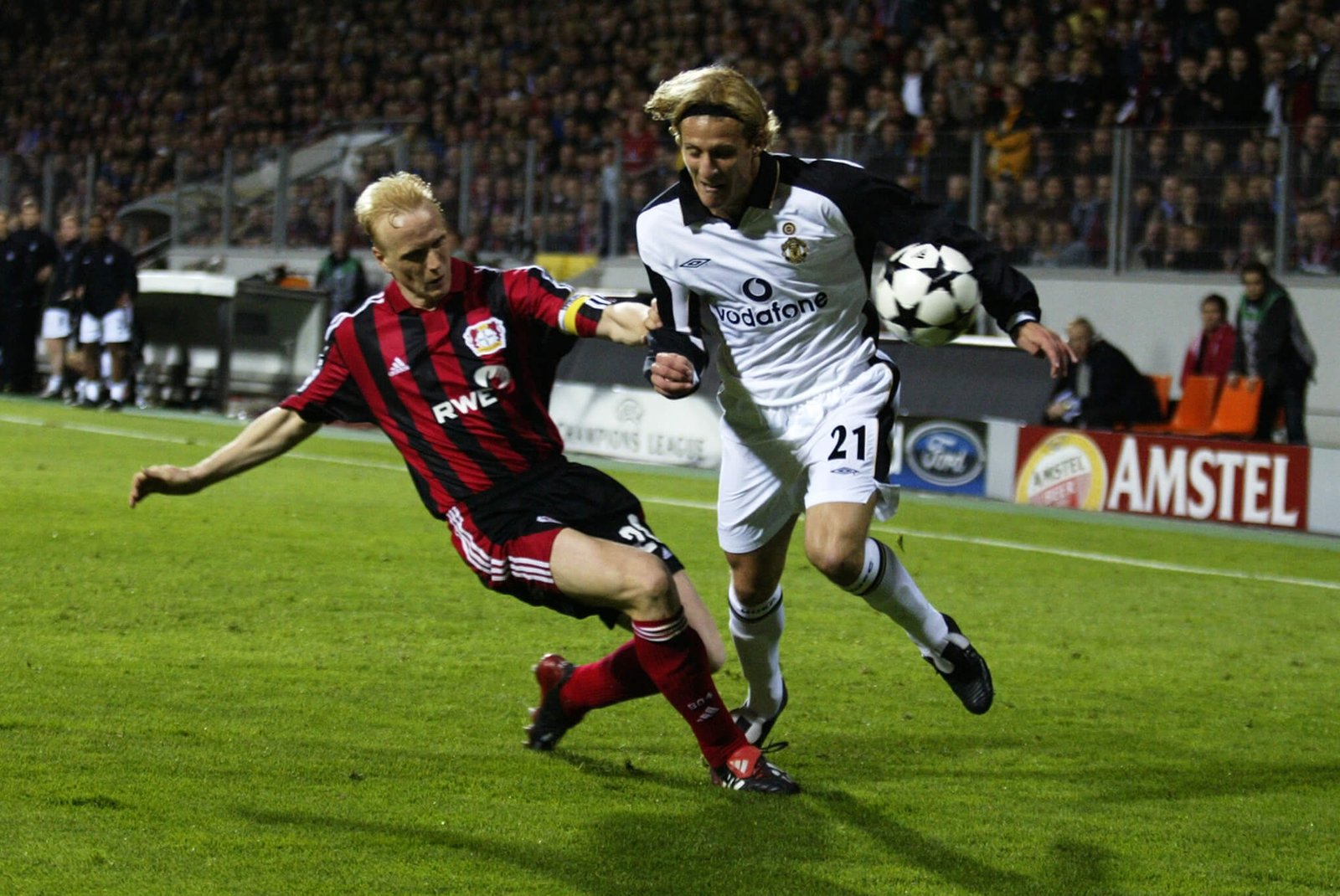
Diego Forlan feels the force of Leverkusen’s Carsten Ramelow in 2002 (Phil Cole/Getty Images)
The Arsenal team of 1936 could sympathise. They had their own knockout distraction, the FA Cup, a competition held in such esteem that, after winning three league titles, reaching the final at Wembley was the priority of Arsenal’s season. (It also meant player bonuses at a time of the maximum wage.)
In the third round at Bristol Rovers, with Arsenal 1-0 down, Whittaker locked Allison out of the dressing room at half-time. “I ripped into the lads… then before I unlocked the door to send them out again past the anxious Allison, I told (Cliff) Bastin and (Bobby) Davidson to switch places. Arsenal clicked from the restart.”
Arsenal won 5-1. When they reached the semi-final, these champions of the three previous seasons won only two of their remaining 11 league games. The FA Cup mattered far more than four-in-a-row and they duly defeated Sheffield United at Wembley.
In 2024, for City and Arsenal, it is fair to say the status of the Premier League and FA Cup has been reversed.
Rising rivals
Sunderland were the team who took Arsenal’s potential fourth title. After losing at Highbury on the opening day of the 1935-36 season, Sunderland won 21 of their next 29 matches. By late February, they were 16 points ahead of Arsenal.
Sunderland had finished sixth in 1934, second in 1935 and were champions for the sixth (and, to date, last) time in 1936. Club legends Raich Carter, Bobby Gurney and Patsy Gallacher scored 81 goals between them, and the team beat Arsenal 5-4 at Roker Park.
It was a similar story for Huddersfield in 1927. Newcastle had Hughie Gallacher in his first full season at St James’ Park and Gallacher scored 36 goals in 38 league games. Crucially one of these was a winner against Huddersfield over Easter in 1927. Newcastle were top, Town third. The papers called it a “staggering blow”. It was Newcastle’s fourth (and, to date, last) title. They were an established power.
In the mid-1980s Liverpool were faced with another growing force, a major club enjoying a renewal — Everton. Manager Howard Kendall built an electric team at Goodison Park and in 1984-85, they won the title by 13 points. Goalkeeper Neville Southall was the writers’ Footballer of the Year and midfielder Peter Reid was Players’ Player of the Year. Everton finished second the next season and were champions again in 1986-87 (by nine points). Liverpool were second on both occasions and champions either side. Theirs were marginal losses and gains.
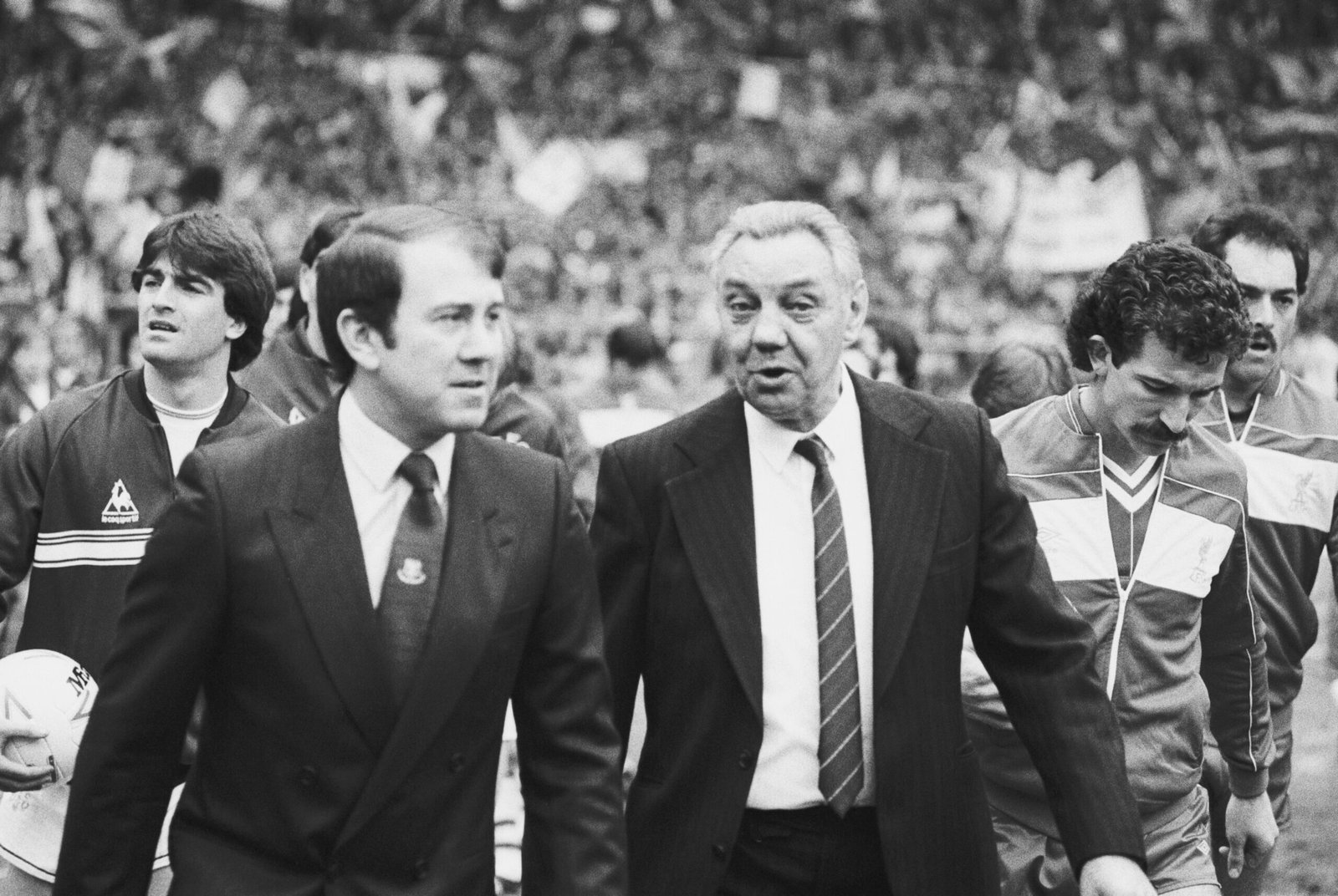
Joe Fagan (right) and Howard Kendall of Everton lead their teams out at Wembley for the 1984 League Cup final (Parry/Express/Hulton Archive/Getty Images)
For United in 2002, there a classic version of Arsene Wenger’s Arsenal to combat. Patrick Vieira, Thierry Henry and co did not lose after December that Premier League season and won their last 13 matches. The run included the decisive 1-0 victory at Old Trafford, sealed by Sylvain Wiltord’s goal, in the penultimate game.
In 2010, it was Chelsea foiling United’s possible four-timer. Fuelled by Roman Abramovich’s Russian economics, Chelsea won three Premier Leagues in six seasons. Managed by Carlo Ancelotti, they scored 103 league goals (Didier Drogba and Frank Lampard getting 51 of them), and ran up a goal difference of 71.
They also had a great goalkeeper, Petr Cech, of whom Ferguson said ruefully: “I should have signed him at 19 when I had my chance.”
With six games to go, Chelsea went to Old Trafford, with United top by a point, and won 2-1. Finishing second by a point, United’s season was hardly terrible. They simply encountered a flowing team.
Manchester City’s 2023-24 edition have met an Arsenal team who finished fifth in May 2022 on 69 points, second in May 2023 on 84 points and who have 86 after Sunday’s win at Old Trafford.
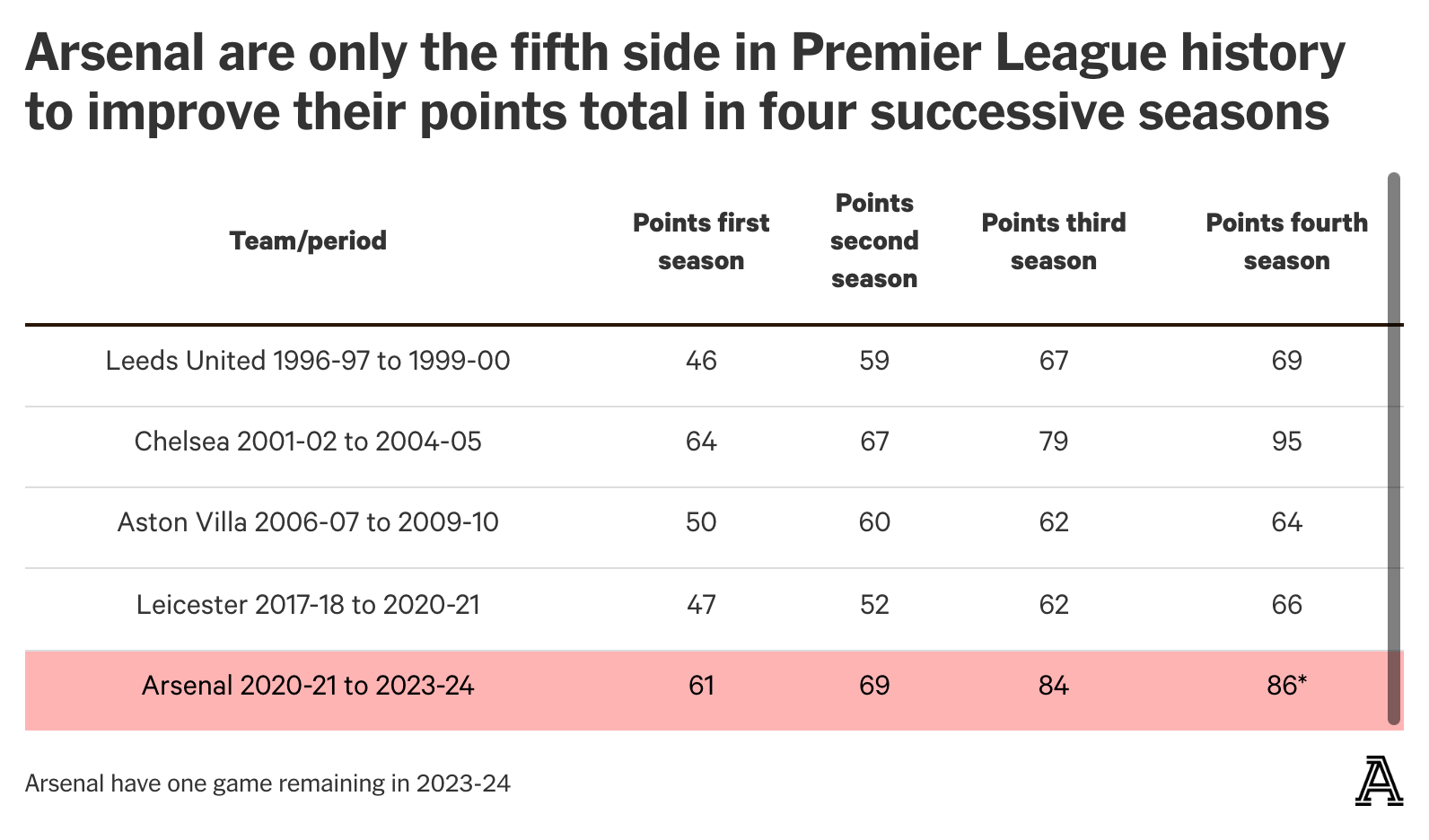
City can reach 91 points. There is a sliver of jeopardy about their trip to Tottenham on Tuesday, but if City do drop points and miss out on four-in-a-row it will not be because of managerial disruption, key player departures or cup distractions. It will be because of Arsenal.
But as the headlines will say, it feels like the fourth is with City. Saturday’s starting XI at Fulham had 31 Premier League titles between them and when the first substitute came on, Kyle Walker added another five. It is an avalanche of quality and experience that will surely make English history.
Then the asterisk arguments will boom again.
(Top photos: Herbert Chapman, Sir Alex Ferguson and Joe Fagan; Getty Images)
Read the full article here


